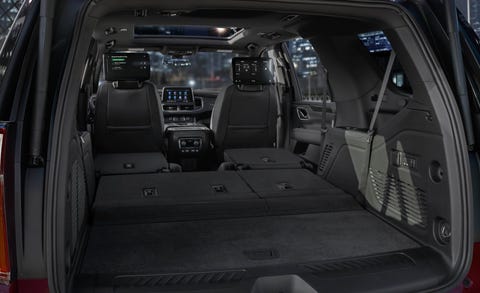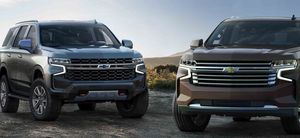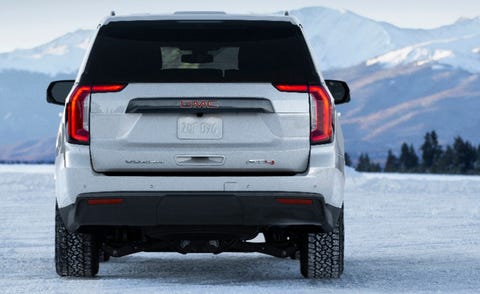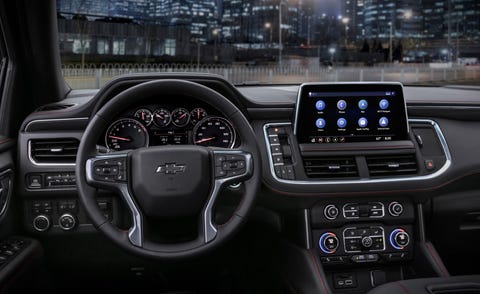- The latest Chevrolet Tahoe and GMC Yukon have just been announced, with the Cadillac Escalade soon to follow.
- Both Chevy and GMC offer the same powertrains, but have different visual design cues and bodywork.
- The new SUVs come out this summer as 2021 models.
General Motors’ full-size SUV siblings used to be twins of each other, with the only real differences being badges and sticker prices. But GM has made efforts recently to differentiate the Chevrolets Tahoe (and the larger Suburban) from the GMC Yukon (and the larger Yukon XL). So now, when you compare the GMC to the Chevy, you’ll find unique styling cues and features—which we’ve outlined here for the new, redesigned 2021 models—but similar mechanicals. This mean that your choice is mainly down to which SUV’s aesthetics and creature comforts you like best.
Platform and Size
The new Tahoe and Yukon both ride on GM’s newest T1 truck platform, which also underpins the Chevrolet Silverado and GMC Sierra pickups. Both brands’ new SUVs are larger than their predecessors on the outside and more spacious than before on the inside. The smaller Tahoe and Yukon have nearly five more inches in their wheelbases—up from 116.0 inches to 120.9 inches. They gain more than six inches in overall length—from 204 inches to 210.7 inches—meaning there’s more space for passengers and greater legroom, especially in the second and third rows. There’s also a massive increase in cargo space, from 94.7 to 122.9 cubic feet.
Part of the reason for such significant increases in cargo space and rear passenger room is the switch to an independent rear suspension, a first for these GM SUVs. In addition to increasing overall interior space, the new suspension setup is intended to improve ride quality and handling dynamics.
Engine Options
Both the Yukon and the Tahoe get a 10-speed automatic transmission across the board, and there are three engine choices. The base engine is a 5.3-liter V-8 making 355 horsepower and 383 lb-ft of torque; there’s also a 6.2-liter V-8 producing 420 horsepower and 460 lb-ft of torque. Both are carryover from the last generation of Tahoe and Yukon but now feature smarter cylinder deactivation systems and stop/start systems.
The third available engine is a turbo-diesel 3.0-liter inline-six that first appeared on the Silverado and Sierra pickups. This engine cranks out 277 horsepower and a healthy 460 lb-ft of torque and could post a 30-mpg highway EPA fuel-economy rating, based on the Silverado and Sierra’s fuel-economy numbers.
The GMC gets a more advanced drive system dubbed Active Response 4WD, exclusive to the Yukon, which works with an electronic limited-slip differential known as eLSD to manage traction and power distribution based on the driving scenario. If eLSD sounds familiar to you, it’s because GM uses it in other more performance-oriented applications, like Corvettes and Camaros. The eLSD makes the Yukon a better performer off-road and in low-grip situations than the Tahoe/Suburban. That’s something to keep in mind for buyers looking at the differences between Chevrolet’s Z71 and GMC’s AT4 off-road-oriented trims.
Exterior Design
GM clearly made sure that the designers were in separate rooms to create the final looks for the SUVs. The only similarities in exterior design are the side and top-down views, which are nearly identical: just look at the window arrangement and pillar design. Everything else is different. In front, the Tahoe’s grille is wider, and the headlights are much narrower and higher up when compared to the Yukon. The Yukon has an imposing grille, but the headlights are wider and occupy more front-end real estate than on the Chevrolet. Moving to the rear, the SUVs have markedly different taillights and liftgates, unlike the outgoing models, which were nearly identical at the rear.
On the Inside
On all trims except for the top-end Yukon Denali, the switchgear, screen setup, climate control panel, and driver’s gauge cluster are the same on the Chevy and the GMC. The only thing that appears to be different (again outside the Denali trim) are the badges on the steering wheel, the interior color schemes, and the trim materials. On the Yukon Denali there’s a different dashboard setup; the screen sits lower on the dash and has two large HVAC vents above it. The Yukon Denali also has nicer wood and leather materials inside to justify its higher price.
Features available on both Chevrolet and GMC models include optional air suspensions, 15-inch head-up displays, active grille shutters, and a plethora of safety and driver-assist features. We will have more information on equipment differences between the Chevy and the GMC when we get full pricing and trim-level information on these new models.
Source: Motor - aranddriver.com










